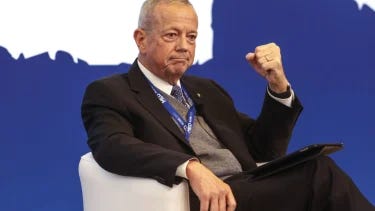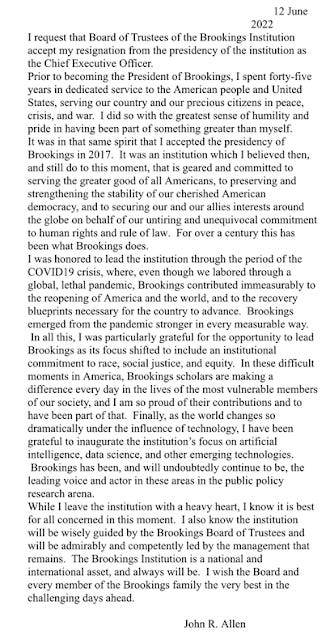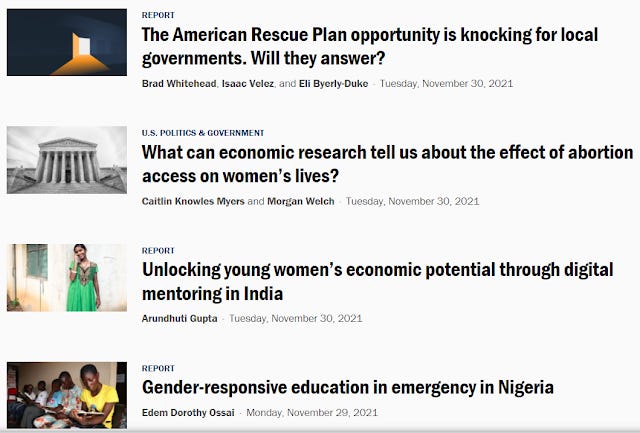A General's Progress
what price your name?
Even though it shouldn’t be necessary, I guess I should start this out by saying I actually support think tanks. I have a whole gaggle of acquaintances and friends who are associated with this think tank or another. They can produce good work – and even though some have clear biases in either their mission or their people – there is good value to read from smart people you disagree with on issues of substance. As long as you know they may or may not be objective – that is fine. As always, a serious read of contrary opinion will either by the strength of their argument make you reassess your previously held position, or by the weakness of their argument, further reinforce your position.
What you cannot do it take what they say – or even what I say – as unalloyed truth.
But no, this is not a general assault on the think tanks. Heck, where else are all these over-credentialed friends and drinking buddies going to find a paying gig while they wait for a political appointment? (snark, I snark because I love).
No, this is about something else – two things specifically. Let us speak as adults to adults.
First, most think tanks (some call themselves “institutes” or “centers” but for shorthand we all know they are think tanks) are in whole or in part not so much about thinking – but about influence. It is the “what” that is being influenced and “why” that is in question.
Some think tanks are very clear what they want to do – they want to promote this side of the political spectrum or the other. CATO is a great example of this. We all know what the libertarian take on the Jones Act will be etc.
There are others who to promote the interests of this area of the world or another. They want to promote a close relationship between this nation and ours … etc. Those I am happy with too because we go in to the dance knowing the song.
What becomes problematic are those who claim they are objective, who claim it does not matter who funds them are, they have no influence on their products and papers … etc. That may be true in part, but in whole? No. That is not how humans work.
“Follow the money” is a great way to try to understand anything human. Money, power, and sex. Look for an explanation in those areas first, and more often than not you will get your answer. This is brain-stem simple – as often humans are.
That is why full disclosure of who is funding a think tank is important. That is why knowing who their leadership has worked for is important. Money. Power. Sex.
That will give you an understanding of the shape of that ship … but then you need to know who the captain of that ship is. That leads us to the second part – and the core topic of today’s post – General John Allen, USMC (Ret.), until last weekend, the head of DC’s establishment think tank, Brookings.
The Brookings Institution's president, retired four-star Gen. John R. Allen announced that he is resigning from the organization amid a federal investigation into his alleged role doing illegal foreign lobbying work for Qatar. Allen was placed on administrative leave on May 10.
Allen said in a resignation letter that his decision is "best for all concerned in this moment," according to the Wall Street Journal.
"While I leave the institution with a heavy heart, I know it is best for all concerned in this moment," Allen said in the resignation letter.
Why?
The decision comes after new federal court filings spell out a potential criminal case against Allen, who joined Brookings in 2017 after leading NATO and U.S. forces in Afghanistan.
Court filings allege that Allen worked to help Qatar influence U.S. policy during a period of time when there was a diplomatic crisis in the Gulf region.
In a search warrant application, Federal Bureau of Investigations Agent Babak Adib wrote that there is "substantial evidence" that Allan violated the Foreign Agents Registration Act (FARA). Allan has not been charged with any crime.
Brookings is in full covering-fire mode ... for themselves;
"Brookings seeks to maintain high ethical standards in all its operations. Brookings has strong independence policies in place to ensure financial supporters do not influence the research findings or policy recommendations of its experts," the statement reads.
"Brookings is not the subject of a federal investigation into a personal trip Allen took to Qatar in 2017 before he became president of the institution. Brookings receives no funds from the government of Qatar. Brookings received funding from Qatar in the past to support operations for research and events. In early 2019, Brookings decided it would not renew funding from the country and would close its Brookings Doha Center, established in 2007. The decision to close the Brookings Doha Center was concurrent with the decision to transition all of Brookings’s foreign centers," it continued.
Yes, but they did, in a fashion. I think "close" is a bit too strong of a word. From their own website:
In September 2021, after 14 years of impactful partnership, Brookings and the Brookings Doha Center announced that they were ending their affiliation. The Brookings Doha Center is now the Middle East Council on Global Affairs, a separate public policy institution based in Qatar.
They changed nametags.
... and they hired Allen knowing his background - and they hired him in October of 2017, the same year he made the trip in question.
We should let the story work itself out in the press and the courts - and you can read a variety of things about here, here, and here.
Let's go back to the question of "why" they hired Allen.
He joined Brookings right after he retired in 2013 after a few tours leading the ultimately shambolic wars in Iraq and Afghanistan. After a short sting, he slotted right in with the Obama Administration. He made his famously cringe worthy appearance at the 2016 (D) convention and after his much expected role in the Hillary Clinton Administration faded in haze of orange dust, he fell back to Brookings in the fall of 2017 where he's been ever since.
Why go there? First - and this was clear at the Democrat convention in 2016 and his work with Qatar as reported - Allen was not done. He still wanted to be in the game. He wanted to influence events. He wasn't done playing.
Hey, I understand. As someone reminded me in a rather funny way last weekend, I left active duty almost 13 years ago, A LONG TIME AGO...and yet in my own way still can't get my head out of the game. Some people can, but others can't. That is Allen.
Did he do it for money? I don't see him as a mercenary for just the money.
How much did he make there?
Well, if you look at Brookings' Form 990 from 2020 (BTW you can research any of your think tanks/institute/etc 990s here), you'll see on page 59 that comes to $972,714 in salary and benefits. Probably had a pay raise and though I don't know exactly what his retirement pay is - as I don't know what additional he gets from the VA on top of normal military retirement, USAToday has this baseline;
Figures for 2011 show that a four-star officer retiring with 38 years' experience received a yearly pension of about $219,600, a jump of $84,000, or 63% beyond what was previously allowed. A three-star officer with 35 years' experience would get about $169,200 a year, up about $39,000, or 30%. Before the law was changed, the typical pension for a retired four-star officer was $134,400.
That was over a decade ago ... so ... adjust accordingly.
Not a bad gig. I will never begrudge a man a good deal or a nice payday, but even in DC, somewhere near $1.2 million+ a year isn't all that bad - and a quarter million for absorbing oxygen is livable. Why then would, if reports are correct, someone feel the need to take iffy money from some petro-pocketstate?
That is something Allen needs to explain but I think it was just a way to stay in the game until another opportunity came around. He was hungry in 2016, and right when he thought Hillary would served him a heaping serving ... Trump took it all from him.
Why would Brookings hire someone like Allen to take over from a more experienced Democrat political operative Strobe Talbot?
Yes, he was a known quantity and a company man, but a long time ago it was explained to me that such organizations do not hire such people for their ideas (I cannot think of anything Allen wrote of significance, can you) or their record of success (IRQ and AFG did not quite work out well on his watch) but because people return their phone calls and accept their invitations. They are influencers. These organizations are buying influence.
Why would Qatar pay money to Allen? Same reason. People returned his phone calls and accepted his invitations. Especially in the fraternity of retired 3 and 4-stars, you get in the short line;
Allen on June 9, 2017, asked then-national security adviser H.R. McMaster to issue a statement calling on the nations to ease a blockade against Qatar. Then-secretary of state Rex Tillerson later that day issued a statement along those lines.
In a meeting on June 10, 2017, Allen allegedly advised the Qataris how to influence the White House, as well as how to "own the narrative" in the United States about the blockade. According to notes Olson took in the meeting, Allen told the Qataris they could "shape" then-president Donald Trump's opinion through McMaster.
Give a new meaning to "bi-partisan foreign policy consensus."
Allen will fight his fight, but he is making sure he does what he can to signal to his team he's still one of them. Did you read his letter? Here it is:
Did you catch that?
That is just embarrassing. It reads like those poor souls whose last words were, "LONG LIVE COMRAD STALIN!" before a hail of NKVD bullets put an end to their suffering.
At the end of the day, remember that institutions and people should always be questioned - including and especially your humble blogg'r here.
Do not accept anything from an institution or a person just because of their CV. The larger they are and the more powerful they are - the more questioning you should be. They may be right, they may be the best - but make them prove it.
More often than not, they're not. Heck, from the cheap seats, it looks like Qatar and Brookings hired Allen for the same reason - not that is made either of them better in the end.
Just look at the internet archive from the first week in December 2021. As the Russians finalized their buildup plans for invasion, inflation was starting to build, China continued unabated, supply chain issues coughed, people were migrating in clear waves from blue states to red ... just look at what they focused on.
Tell me why to be a "serious person" I should care about anything from Brookings unless I am using it for opposition research?
Nope.
Looking at who they hire and what they they think is important ... nope.
Hard pass.






Every serious scientific, engineering, or other academic paper includes a short bio of the authors (as we also find with USNI article) so that the readers may better judge the credibility of the paper’s conclusions. I propose that every position paper delivered by a think tank include a concise list of the actual top 60-70% (by dollars) funders of the organization. That would allow the rest of us to follow the money.
Not terribly surprised overall. While Brookings often gets painted as left-leaning, they argue (with some basis) that they are not particularly ideological, but in the absence of ideology, it is pretty easy to just fall into influence peddling.
Personally, for think tanks, I am a CSIS and Hudson fan. Paying more attention to German Mashall Fund of the US since they have hired a PRC analyst I started following at CSIS.